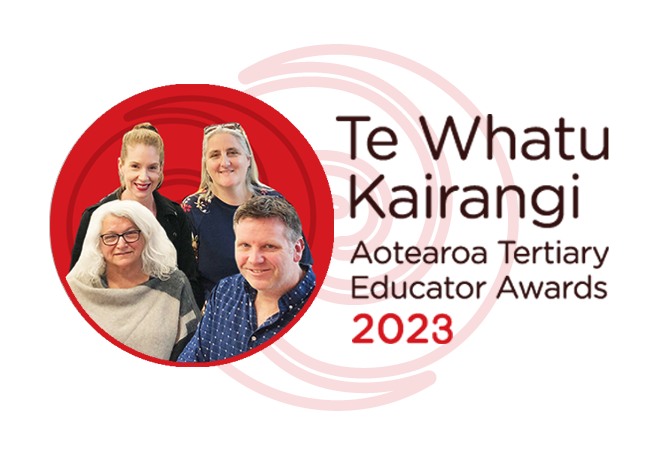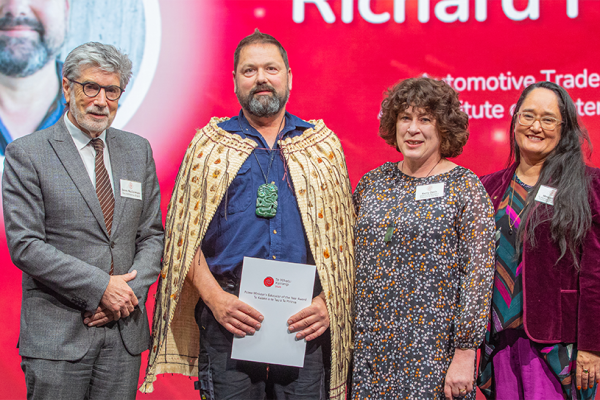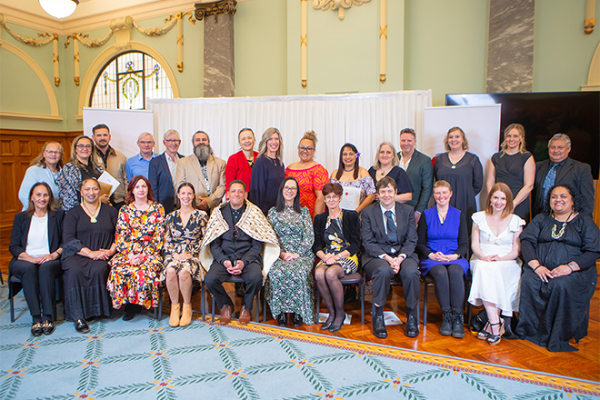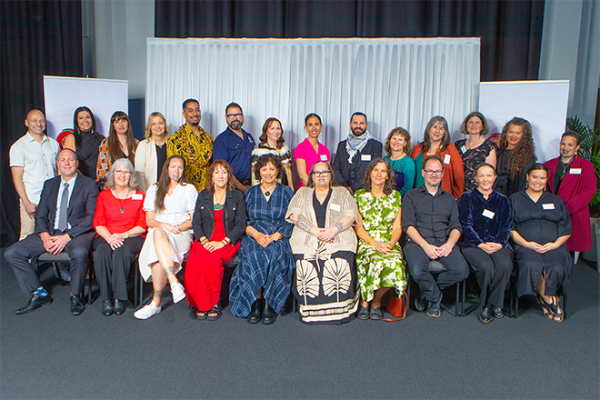CELS191 Teaching Team
National leaders in tertiary biology education
Group Category Winner | Progressing on seamless ākonga transitions between contexts
Whare Wānanga o Ōtākou | University of Otago CELS191 Teaching Team
CELS191 Teaching Team group members (left to right): Andrea Brown, Dr Kim Watson, Dr Lisa Russell and Dr Keith King.
Watch the CELS191 Team Teaching profile video
The largest paper at the University of Otago is CELS191 (Cell and Molecular Biology), boasting an enrolment of 1,800-2,000 students. As a component of the Health Science First-Year programme and prerequisite for various science degrees, CELS191 (referred to as 'CELS') plays a vital role in shaping the academic journey of approximately 45% of Otago first-year students. CELS is delivered by the core teaching team consisting of Dr Lisa Russell (Course Co-ordinator), Andrea Brown, Dr Kim Watson and Dr Keith King, supported by a broad range of staff whose huge contributions cannot be understated.
Departing from the traditional "sink or swim" approach of tertiary education, the CELS team supports every one of their students. They facilitate a smooth transition to university for the students and provide outstanding pastoral care, knowing that this can greatly influence student success, not only in the first year but also in future years. At the heart of the paper is a student-centric philosophy that prioritises creating safe and inclusive learning environments, where students thrive and learn with confidence. The CELS team’s individual passions for teaching, seamless collaboration and outstanding leadership were recognised with a University of Otago Teaching Excellence Award in 2023.
The students come from diverse backgrounds. Approximately 80% of CELS students enter through NCEA and most come to university immediately after finishing school. They are expected to transition successfully to life at university where teaching and learning techniques, assessment and responsibilities are very different from those in high school. In addition to navigating the uncharted waters of tertiary learning, they leave behind the familiar comforts of school, home and whānau, with many moving from another city or country. Student well-being and success are at the core of CELS as they embark on an experience that goes beyond education.
Students transitioning from CELS go on to a diverse range of subjects (CELS191 is a prerequisite for 23 Otago degrees). Many enter a health professional programme, such as Medicine or Dentistry, while others choose science degrees, such as Biochemistry, Microbiology or Zoology. CELS lays a solid foundation for these different paths.
“The CELS191 teaching team provided me with continuous exceptional teaching and went above and beyond… I have now finished my third year… (in Medicine) and honestly believe that I owe my success in university to the wonderful care that [they] provided me in what is a difficult transition into tertiary education.” (2020 student)
The CELS team facilitates a smooth transition from high school to university. The quest for top marks to enter the health professional programmes creates immense pressure and anxiety among many students. The CELS team address this by fostering a sense of community and a warm, inclusive and supportive environment where students feel connected, providing assurance around assessment, and providing comprehensive resources to support all learners.
Past CELS academic convenor, Professor Bruce Russell, states: “Over the past 20 years, I have taught a range of undergrad courses in three international universities and without a doubt, CELS provides the most comprehensive pastoral care of any paper.”
They have implemented initiatives to address poor academic performance in CELS191 through targeted early interventions. Their own research has shown that engagement during the initial weeks of semester is a predictor of future performance. Therefore, they closely monitor the progress of non-engaged students at critical points throughout the semester and they provide timely and tailored messages to help students get back on track. Pastoral and practical advice around engagement and preparing for assessments is also provided.
The CELS team uses their experience to train excellent demonstrators (senior students employed to help in labs). Students demand a lot from demonstrators and feedback shows that CELS191 students are highly satisfied with the level of support the demonstrators provide (94% of students surveyed in 2022 considered the demonstrators to be very well prepared).
To ensure demonstrator success, the team provide targeted training. Professional development of demonstrators is unique among undergraduate papers at Otago. The demonstrator training programme covers not only content, but also topics such as asking questions that require students to explore concepts (“tell me what you know about this”), real-world examples and analogies (e.g., likening the plant central vacuole to a balloon within a box), and facilitating small-group discussions. This programme scaffolds the demonstrators into successful teachers, improving the experience for both student and demonstrator.
They place paramount importance on nurturing student hauora, their holistic wellbeing. They equip their demonstrators with a comprehensive knowledge of avenues for students to tap into the University's extensive support networks for course-related, skills-based and health-related issues (such as support provided by the CELS team, the mental health team, or peer-assisted study sessions facilitated by ‘Student Learning Development’). The CELS team urge their demonstrators to promptly escalate any concerns to the team.
As one demonstrator affirms: “We are instructed to look out for students' wellbeing… and report… if we have any reasons to be concerned for students’ progress through the paper, their university life or health in general.”
As a dynamic team, the CELS team work to implement new initiatives, acknowledging that their students are like a fast-moving current, with ever-changing needs. These initiatives are not limited to just CELS, with the team regularly driving initiatives that influence other papers and programmes. This year the CELS team, in collaboration with other paper co-ordinators, developed a series of Health Science First-Year-wide ‘study skills’ workshops that targeted common challenges students face in their first semester of university. These workshops taught students time-management skills and effective note-taking – challenging them to try new approaches and preparing them for high-stakes assessment. While voluntary, some 1,200 students (67% of the class) attended, or streamed, the initial workshop.
Much how throwing a stone into a river creates ripples, the team’s initiatives have ripple effects. Each new initiative has been purposefully developed to address a new challenge faced by their students and, ultimately, reduce barriers to learning. They constantly seek opportunities to improve and expand their initiatives to effect larger scale changes. Driven by their passion for educating, they are committed to elevating the CELS experience for future students and staff.



